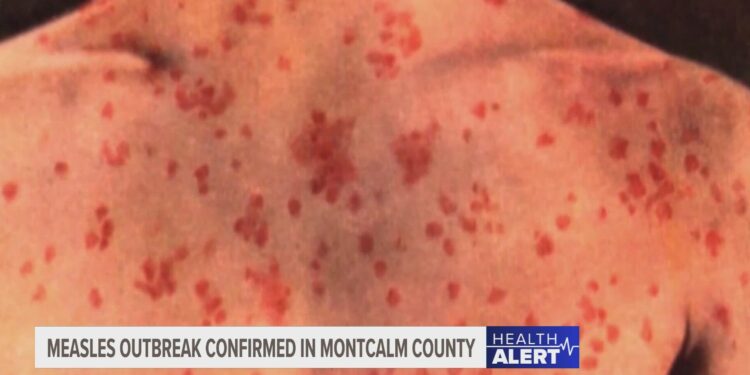Urgent Call to Action: Addressing the Measles Threat in America
As vaccination rates fluctuate and public health communications face challenges, experts are raising alarms about a potential resurgence of measles—a highly infectious virus that was once eradicated in the United States. Recent findings suggest that the country is approaching a “critical threshold,” where declining immunity and increasing vaccine skepticism could lead to significant outbreaks. In this pivotal moment, scientists and health authorities are advocating for immediate measures to enhance vaccination efforts, aiming to avert a resurgence that could endanger community health across the nation. The ramifications of this trend extend beyond individual well-being, highlighting concerns regarding herd immunity and the possible return of diseases previously considered under control.
Measles Surge Raises Concerns for Public Health
The recent uptick in measles cases throughout the United States has sparked alarm among public health officials. With vaccine hesitancy and misinformation proliferating, experts caution that we may be on the verge of a serious public health emergency. Measles is an extremely contagious viral disease that not only threatens unvaccinated individuals but can also trigger outbreaks in communities with varying levels of immunization. This troubling rise emphasizes an urgent need for renewed initiatives aimed at promoting vaccinations and educating citizens about their significance.
The current situation is influenced by several factors:
- A decline in vaccination rates across specific regions
- The dissemination of anti-vaccine narratives via social media platforms
- An increase in travel resulting in imported cases from countries facing outbreaks
In response to these challenges, healthcare professionals are calling for prompt action, stressing the importance of comprehensive strategies designed to boost vaccination coverage—particularly within historically underserved communities. Public health campaigns must deliver clear messages countering persistent myths surrounding vaccines while reinforcing community responsibility towards safeguarding collective well-being.
Threats to Herd Immunity and Community Health
Recent data indicates a worrying decline in vaccination rates across various states within the U.S., posing significant risks to public safety. To maintain herd immunity against measles—a highly contagious illness—at least 95% coverage within communities is essential. Unfortunately, many areas currently fall short of this critical benchmark according to recent statistics. Experts warn that as immunization rates drop, outbreak risks escalate dramatically; vulnerable groups such as infants who cannot yet be vaccinated or individuals with compromised immune systems face heightened dangers.
The implications stemming from these gaps are severe; an increase in measles cases could overwhelm healthcare facilities while leading to complications like hospitalization or long-term health issues among affected individuals. To illustrate geographical disparities regarding vaccination coverage more clearly, consider this table showcasing percentage figures across different states:
| State | % Vaccination Rate | % Herd Immunity Threshold Required | |||
|---|---|---|---|---|---|
| California | 87 | 95 | |||
| Texas | 90 | 95 |
Tackling both individual and communal health requires intensified awareness campaigns alongside robust vaccination initiatives aimed at improving uptake levels throughout society. Some effective strategies include:
- Enhancing Public Education – Delivering straightforward information on vaccine benefits.
- Improving Access – Establishing additional clinics with flexible hours tailored for families’ needs.
- Incentive Programs – Motivating vaccinations through rewards or community support initiatives.
Essential Actions Needed To Prevent Measles Resurgence In The U.S.
The alarming rise in measles incidents necessitates a multifaceted strategy focused on protecting public welfare effectively . Health officials along with local leaders must prioritize strong educational outreach programs emphasizing why vaccinations matter significantly . These efforts can empower parents by equipping them with accurate knowledge while addressing misinformation fueling vaccine reluctance . Potential approaches might involve :
- < strong >Leveraging social media channelsto share evidence-based insights widely;
- < strong >Partnering up with local influencersand medical professionals reaching broader audiences;
- < strong >Hosting community-wide immunization eventsfeaturing free screenings & informative sessions;
Additionally ,< strong style = "font-weight: bold;" class = "has-inline-color" color = "#000000" style = "color:#000000;">increasing access points for vaccinations< /span >  ;is crucial combating disease’s comeback . Healthcare systems should eliminate barriers preventing families from receiving necessary shots . This may entail deploying mobile clinics into underserved neighborhoods & extending operational hours beyond traditional schedules accommodating working parents better . Initiatives should also focus on tracking immunization statistics identifying high-risk areas prone outbreaks effectively.< /span>  ;The following table outlines key actions facilitating accessible services :< /span>  ;< /span>  ;< /span>  ;< /span>  ;
| Description | < tbody Conclusion: A Call For Collective Action Against Measle Outbreaks Across America! |
|---|










